5 Tips Every Veteran Should Keep In Mind When Writing Their College Admissions Essays
In honor of the start of college admissions season, I’m offering some tips I learned during my time as an...
By Joy Turner | Published Sep 7, 2018 7:37 PM EDT
- Military Life

In honor of the start of college admissions season, I’m offering some tips I learned during my time as an admissions application reader and writing consultant tailored to help veterans write college application essays that actually stand out.

Answer the question
In the military, we’re taught to write memos and SOPs in a straightforward and technical manner. Still, I’ve read dozens of college admissions personal statements from veterans that tell a wonderfully engaging story about their time in the service, but fail to answer the questions asked in the essay prompt.
This issue comes up a lot especially for applicants using an essay template to apply to multiple colleges. Don’t focus on telling me about a personal challenge you overcame while in the military if I asked you to talk about why you chose to apply to X school. As a good practice, go back and read the essay prompt after you’ve written your personal statement or essay, then underline each instance in your essay where you directly answer the prompt. This will tell you if you’re on track or not.
Show, don’t tell
Use every opportunity to tell a story. Admissions staff aren’t interested in reading a list of your accomplishments as if they’re on a promotion board perusing your military personnel file. Instead, tell a story that leaves them wanting to know more about you and what you accomplished during your military service or in your personal life.
As with job interviews, I recommend applicants implore the STAR method – which will provide details about the specific situation, task, action, and result of the story you are telling in a logical order. Reading a list isn’t necessarily interesting, but reading a story can be. Being interesting is what gets you an invite to the next cohort. Give the admissions readers a reason to want to meet you in person by telling them a story that is personal, engaging, and thought-provoking.
Start with bullet points
If you’re having trouble figuring out how to tell your story, I also recommend starting with bullet points. When it came time to write evaluations for my soldiers as a platoon leader, I often started the process by listing 3-4 bullet points under each section on the evaluation form which allowed me to concisely articulate the soldier’s accomplishments and begin to create a narrative about their performance.
For personal statements, outline the story you want to tell from beginning to end using bullet points. Creating an outline will allow you to clarify your thoughts and identify where information might be confusing to the reader (remember most people have not served in the military and have no concept of rank or MOS).
Often, college admissions applications serve as the first-time veterans have an opportunity to write about their service and it can be daunting to get started. The content of the bullet points can become the skeleton for your essay paragraphs and allow you to easily connect ideas and shape your story.
Don’t repeat information
Admissions readers know you have a lot of awards and have traveled to various countries over your military career because they can easily read this type of information on the resume that is submitted with your application. Don’t repeat it over again in your personal statement and supplemental essays. The admissions staff wants to know how you differ from the other 100 applicants who have also won awards or worked in foreign countries, what makes you unique? Talk about what you can bring to the incoming cohort as a veteran and individual that’s going to make an impact and increase the knowledge base, culture, and prestige of the institution.
Colleges are as interested in what benefits you can provide them as you are about what you will get out of the deal. Communicate in your personal statement what distinctive role you will fill, what value you bring to the classroom and your future profession, and how you will enrich the experiences of your classmates.
Be specific and stand out
Most applicants say at some point in their college application essays that they are “hardworking” or “passionate about making the world a better place”. Neither of these attributes is unique to veterans or servicemembers, nor do they particularly stand out as demonstrative of a person’s character to application readers who are reviewing 1000s of applications. To succeed in college, every student SHOULD be hardworking and passionate about their studies or a broader cause. Instead of relying on generic application clichés, write about your personal motivation for joining the military, how your identity and life thus far have informed your professional goals, or about what impact you personally hope to have on the world around you outside of your military service.
Remember, it’s perfectly fine to discuss your military service in your personal statement despite the stigmas veterans sometimes face in our society today. The important thing to keep in mind is that the application essay is a representation of you on paper and one of the only opportunities you get to make an impression before you arrive on campus. Just like in a job interview, it’s essential you demonstrate your unique value and why you deserve a seat in the (class)room.
This is a part of a series on hacking higher education in partnership with Service to School , a non-profit that provides free college application assistance to transitioning service members and veterans
Subscribe to Task & Purpose Today
Get the latest in military news, entertainment and gear in your inbox daily.

Military Edu Path
Empowering Veterans' Futures Through Education
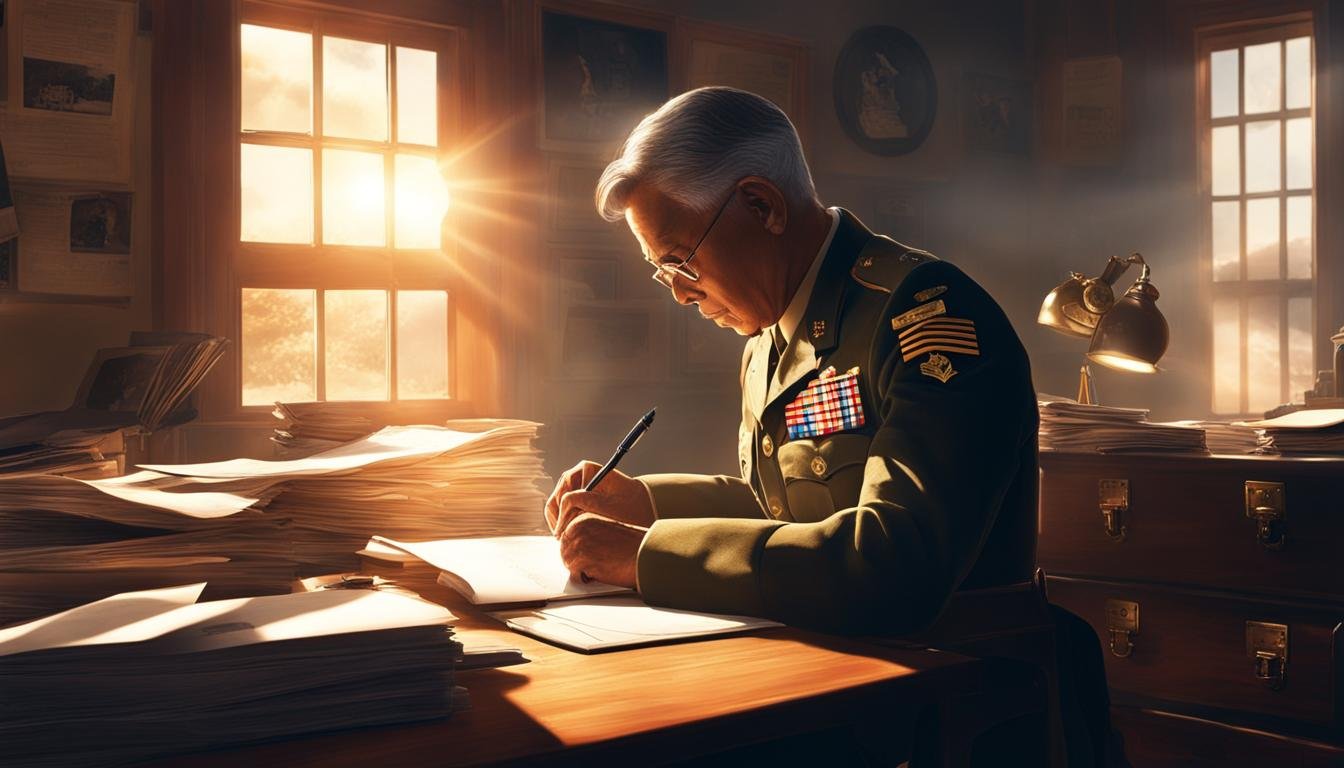
Writing a Compelling College Essay as a Veteran
If you’re a veteran looking to make a strong impression with your college application essay, you’re in the right place. Writing a compelling essay that showcases your unique experiences and strengths can significantly enhance your chances of being accepted into your desired college or university.
As a veteran, you have a wealth of valuable experiences to draw upon that can make your essay stand out from the rest. By effectively leveraging your military background, highlighting your leadership abilities, and demonstrating personal growth, you can craft an essay that captivates college admissions officers and showcases your potential.
In this article, we’ll provide you with valuable tips and advice on writing an impactful college essay as a veteran. From choosing the right essay topics to structuring your essay in a compelling way, we’ll guide you through the process of creating a standout essay that sets you apart from other applicants.
Key Takeaways:
- Highlight your leadership abilities and responsibilities in the military to demonstrate maturity and potential.
- Avoid common essay themes that do not provide insight into personal growth or character.
- Showcase problem-solving skills and maturity by discussing challenges faced and how you overcame them.
- Emphasize the importance of telling a specific story that showcases the unique details of your military service.
- Seek guidance from education services officers and utilize resources available through the VA and military education centers.
Captivating the Reader with Your Personal Story

The college essay is an opportunity for you, as a veteran, to craft a standout narrative that captivates the reader. By following certain strategies, you can write a powerful college essay that highlights your unique experiences and attributes. Here are some veteran college admissions essay tips to help you create an impactful and compelling essay.
Table: Key Strategies for Writing a Powerful College Essay as a Veteran
By applying these strategies, you can craft a standout college essay that showcases your unique journey as a veteran and effectively communicates your goals, strengths, and potential contributions to the college community.
Expert Guidance for Veteran College Essay Writing

When it comes to writing a compelling college essay as a veteran , seeking expert guidance can make all the difference. Experienced admissions application readers and consultants have valuable insights to help you craft an impactful essay that showcases your unique experiences and strengths. Here are some expert tips to guide you on your journey:
- Be authentic and specific: Avoid generic clichés and instead focus on telling a personal story that captivates the admissions staff. Highlight specific situations and results using the STAR method (situation, task, action, result) to provide clarity and engage the reader.
- Emphasize your uniqueness: Stand out from other applicants by highlighting what makes you unique as a veteran. Discuss the skills and values acquired during your military service that can contribute to the college community.
- Stay focused on the prompt: Answer the essay prompt directly and avoid going off-topic. Be sure to address the prompt’s specific requirements and demonstrate how your experiences align with the college’s values and goals.
“Crafting a standout college essay as a veteran requires a balance of personal storytelling and alignment with the college’s mission and values.” – Admissions Consultant

Remember, while seeking guidance is important, the essay should ultimately reflect your own voice and experiences. Be sure to seek feedback from others, but ensure the final essay remains a true representation of yourself.
Table: Veteran College Essay Examples
By following these expert tips and utilizing veteran college essay examples , you can write an impactful college essay that stands out to admissions officers and highlights your unique journey as a veteran.
How Can Writing a Personal Statement as a Veteran Differ from Writing a College Essay?
When crafting a compelling personal statement as a veteran, the focus may be on highlighting military experiences, leadership skills, and resilience in the face of challenges. In contrast, a college essay may emphasize academic achievements and personal growth. Both require unique perspectives and articulation of individual strengths.
Writing a compelling college essay as a veteran requires utilizing your military experiences effectively. Focus on showcasing your leadership abilities, discussing the challenges you faced, and sharing specific stories that highlight your personal growth. It is essential to seek guidance and expertise from education services officers and military education centers, as they can provide valuable resources to support your essay writing process.
Remember to tailor your essay for each college you apply to and avoid generic clichés. Clearly answer the essay prompt and strive to tell engaging stories that capture the reader’s attention. Make your essay experiential and descriptive, ensuring that it is both a compelling read and within the word count limit provided by the college.
Emphasize what makes you, as a veteran, unique and how you can contribute to the college community. Reflect on your personal motivation for joining the military and the impact you have had outside of your military service. Demonstrate your ability to stand out and make a positive impact in the college setting. While seeking feedback is important, always ensure that your essay remains a personal representation of who you are as a veteran.
- High School
- College Search
- College Admissions
- Financial Aid
- College Life
A Veteran’s Ultimate Guide to Applying to College
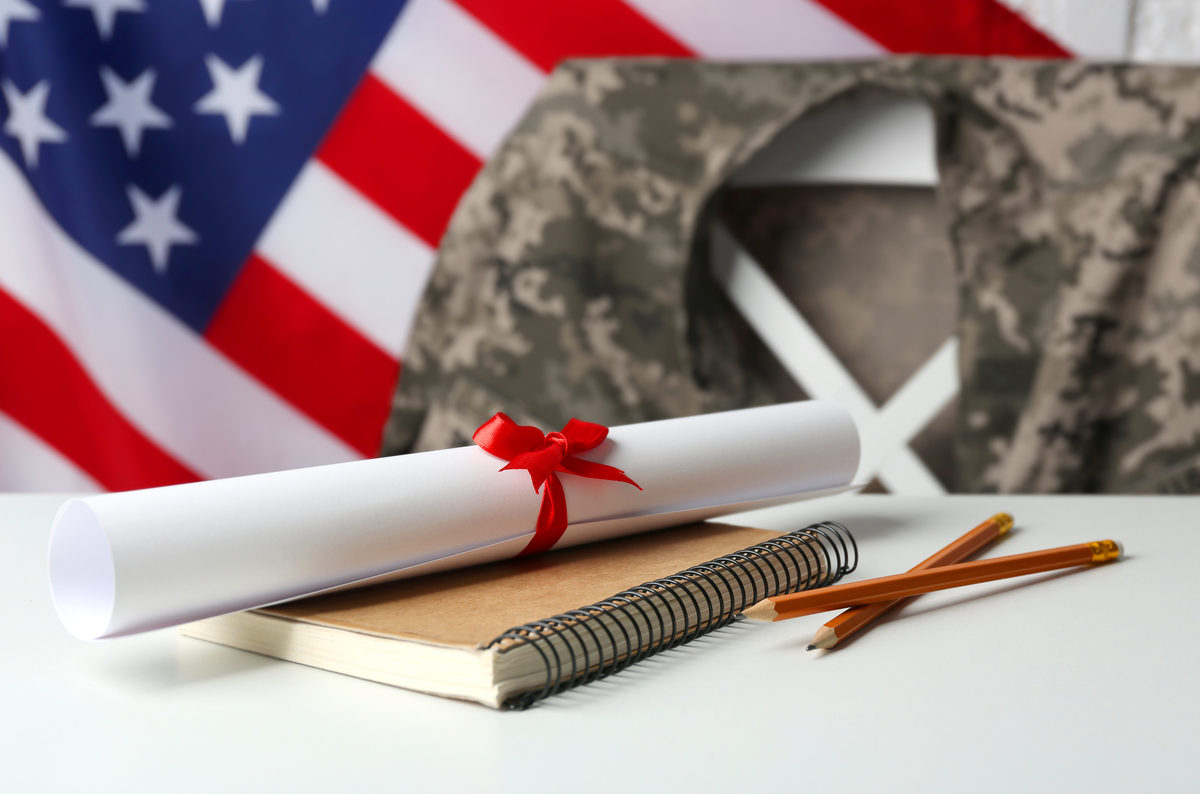
If you’re a veteran and considering going to college, the process may feel overwhelming at first. How do you choose a college? How do you apply? And how will you pay for it?
Sit back, relax, and read through this guide to get the answers to all your questions. You’ll see that the process isn’t as complicated as you think.
Consider Your Future Career
Before you make your next move, it’s important to look to the future. You need to know where you’re headed before you start off on your journey.
So, what career(s) are you interested in? If you aren’t sure yet, consider your talents, interests, and factors such as salary and career outlook.
There’s also a great resource for veterans considering their career options: My Next Move for Veterans . Explore information about specific careers, browse careers by industry, or even find careers related to your military job.
Make a List of Colleges
Once you’ve decided on a career field, you can choose the best route to achieve your goal. Research the degree you’ll need to land a job in the career you’ve selected. Then, look for schools with strong programs for that degree . Pay attention to career resources offered by the school, as well as career placement rates.
Next, consider factors such as:
- Public vs. private
- Large school vs. small school
- Student-faculty ratio
- Nearby entertainment, internships, and career opportunities
- On-campus entertainment and activities
- Programs to support students
- Programs to support veterans
Another consideration is whether the schools on your list accept the GI Bill . The GI Bill finances all or part of college tuition and fees for qualifying veterans, but you can’t use the benefits at every school.
Consider Your Chances of Acceptance
You should also consider your chances of acceptance. Niche has a handy College Admissions Calculator that helps you determine your chances of getting into schools across the country.
The best strategy is to apply to safety schools, target schools, and reach schools – this is your college list . Safety schools are schools where you’re almost guaranteed to be admitted. Your numbers are above average based on the statistics you’ve reviewed.
At target schools, you’re right on target and likely to be admitted. At reach schools, your numbers are below average. However, it’s worth applying to a couple of reach schools that interest you because numbers aren’t the only factor that colleges evaluate. You never know what might happen!
In total, apply to 7-10 colleges. This gives you plenty of options without spreading yourself too thin. Narrow your list down to 2-3 safety schools, 3-4 target schools, and 2-3 reach schools.
Explore Financial Aid Options
Now that you know where you want to go to college, you’ll have to determine how to pay for it. In addition to the options available to all prospective college students, there are financial aid options specifically for veterans.
For veterans, there’s the GI Bill and the Yellow Ribbon Program. The GI Bill pays tuition, a monthly housing allowance, and an annual stipend for textbooks and school supplies. To qualify, you must have served a minimum of 90 days of active duty in the military.
Based on how long you served, you can qualify for full benefits or a portion of the benefits. If you qualify for full benefits, the GI Bill will pay up to full tuition at an in-state public school. The national maximum for a private or for-profit school for the 2019-2020 school year is $24,476.79. Typically, this amount slightly increases each year.
The VA provides a search tool to help you search for GI Bill approved schools. You can also call a school’s admissions department and ask if the school accepts the GI Bill.
Some schools, especially private schools, also participate in the Yellow Ribbon Program. Through the Yellow Ribbon Program, schools agree to waive all or part of the tuition not covered by the GI Bill. Use the VA’s interactive map to see which schools participate in the program.
You may also qualify for fee waivers or tuition discounts at certain military-friendly schools. Finally, look into traditional financial aid options like:
- Scholarships
- Work-study programs
- Loans (as a last resort)
Once you’ve finalized your list of colleges, it’s time to complete and submit applications. It’s critical that you don’t miss your deadlines, so create a calendar to help you keep track.
Many colleges accept the Common Application. It’s a standard application that you fill out once and send to several colleges, saving you valuable time. For other colleges, you’ll have to complete an individual application through the school’s website.
Application requirements generally include:
- Transcripts
- Test scores
- List of extracurricular activities and achievements
- Letters of recommendation
- Personal statement/essay
Colleges conduct holistic evaluations, meaning they consider the “whole person” in reviewing applications. Numbers are important, but so are personal characteristics, values, diversity, and other factors. Colleges want to admit students who will make valuable contributions to campus and who align with the school’s mission and core values.
After applying, you’ll stay up to date with admissions decisions through your email and the applicant portal of each school. Pay attention to ensure that you don’t miss any important communication.
Weigh Your Options
Once the acceptance letters start rolling in, it’s time to weigh your options and decide where you’d like to go.
Consider the factors mentioned at the beginning of this article again. Evaluate your financial aid packages and how much each school will cost you. If possible, visit campus. Seeing the school in person and imagining yourself living and learning there for four years is one of the best ways to make your final decision. Talk to students and alumni, stop by popular locations, briefly sit in on a class if you can, etc.
If you’re having a hard time deciding, make a pro/con list of your top schools. Remember to look for a school that’s truly friendly to the needs of veterans. Do they provide access to mental health and medical support? Veteran programs? A central point of contact to help veteran’s navigate the college experience?
When you’ve made a decision, you’ll have to decline other offers and send the winning school your decision and enrollment deposit. There’s a deadline for this decision too, so don’t miss it!
Final Thoughts: A Veteran’s Ultimate Guide to Applying to College
Hopefully, reading this guide has eased some of your concerns about applying to colleges. Start by determining your destination: What career do you want to pursue?
Then, find colleges that appeal to you and will help you reach your goals. Explore traditional financial aid options and financial aid options specifically for veterans. Start applying, receive your decisions, and weigh your options. Finally, make a decision and send your enrollment deposit by the deadline.
Once you’re in college, there are plenty of resources to help you through it. There are advising offices, career resource centers, tutoring centers, and departments and services in place to assist veterans through the process. It may seem overwhelming at first, but you’ll find that you have support every step of the way.
Author: Jason Patel
Jason Patel is the founder of Transizion, a college counseling and career services company that provides mentorship and consulting on college applications, college essays, resumes, cover letters, interviews, and finding jobs and internships. Jason’s work has been cited in The Washington Post, BBC, NBC News, Forbes, Fast Company, Bustle, Inc., Fox Business, and other great outlets. Transizion donates a portion of profits to underserved students and veterans in of college prep and career development assistance.
More Articles By Niche
The FAFSA has undergone several changes this year, causing unexpected delays for both students and colleges.
Here are my seven tips to the early high schooler in preparing for a strong college application.
We spoke with staff and faculty at Interlochen Arts Academy and Interlochen Arts Camp to get their best tips on overcoming perfectionism, developing confidence, and showcasing your artistic gifts.
- Cover Letters
- Jobs I've Applied To
- Saved Searches
- Subscriptions
- Marine Corps
- Coast Guard
- Space Force
- Military Podcasts
- Benefits Home
- Military Pay and Money
- Veteran Health Care
- VA eBenefits
- Veteran Job Search
- Military Skills Translator
- Upload Your Resume
- Veteran Employment Project
- Vet Friendly Employers
- Career Advice
- Military Life Home
- Military Trivia Game
- Veterans Day
- Spouse & Family
- Military History
- Discounts Home
- Featured Discounts
- Veterans Day Restaurant Discounts
- Electronics
- Join the Military Home
- Contact a Recruiter
- Military Fitness
How to Use Military Life in a College Application

When it comes to your college application essay, you probably are not going to write about the three months you spent "finding yourself" in the Seychelles. The value of your spring break trip through Patagonia seems equally doubtful.
We're guessing you won't even be writing about the 107 cats you saved from that burning building last year.
Why? Because that is not your life. The military is. And you want to know how to use your military life experience in your college essay.
What to write for college essays?
For many prospective students, the essay required by colleges and graduate schools can be the most difficult part of the application process.
"I have no idea what to write about and these suggestions don't make any sense to me," said Rebecca, a college-bound Air Force spouse I met thumbing through essay help books at her local Barnes + Noble.
"If everyone else is writing about priceless, incredible adventures or their plans to free the world from AIDS by 2018, what would writing about military life add?"
We asked military spouses (including some former military brats) for their experience, and we found out that for many, writing about military life added a lot of heft to their application.
Rebecca was hesitant. "What am I supposed to do? Talk about the time I parked in the wrong parking spot? Or didn't know about colors? Or that PCS where everything broke?"
Maybe you are thinking about the deployment when everything went wrong: the washer broke the day he left, and your car died on the way to the hospital with you, in labor, inside it. Or maybe you will be writing about the challenges your family has faced with budget cuts, sequestration and looming layoffs. Perhaps you will even open up about PTSD.
But no matter what aspect of it you choose, leveraging military life in your college application can lift your application from the stacks of mundane, boring essays and bring it to the top.
Open up to stories about your real life
"I applied to a distance learning program at a Boston liberal arts college," says Bethanny, an Army wife. "Writing that application felt like the hardest thing I've done. But I'm pretty sure I was the only one who wrote about dealing with three girls, a PCS, and a husband facing PTSD."
The idea of opening up about her personal life frightened her, Bethanny admits, but her topic was open-ended: Tell us about a moment when you applied something you learned in school to a real-life event.
"I spent a lot of time thinking about that, and the first idea I thought of was persistence," she explains. "Yeah math is hard and you have to stick with it. But learning that in second grade, you don't realize you'll be using it one day in your own family."
This was an early lesson, but an invaluable one. Persistence has carried her through every challenge her family has faced, she said, and it's the hallmark of her experience as a military spouse.
"I try to tell my oldest girl that when teachers say "you'll use this later," it's not about actual fractions or multiplication tables. It's about what you're learning about yourself when you struggle with those."
Bethanny poured her heart out in her application, and when she was finished with her last draft, she knew she had successfully made her point.
"Military life is harder than anybody's summer internship at a hospital or your mission trip to Zambia," she says. "That's pretending to know real life. I'm living it."
Focus on a powerful story
That real-life experience is something that can help you stand head-and-shoulders above the other applicants. But to use it to your advantage, you have to make sure you focus your military experience into a powerful, personal story.
According to the experts, the best way to make your essay count is to focus it on personal experience, keep it unique, and use it as an opportunity to really express your own voice. It is your one chance to tell the admissions committee something about you they do not already know.
"View it as an opportunity," encourages the admissions team at Carleton College . "The essay is one of the few things that you've got complete control over in the application process, especially by the time you're in your senior year. You've already earned most of your grades; you've already made most of your impressions on teachers; and chances are, you've already found a set of activities you're interested in continuing. So when you write the essay, view it as something more than just a page to fill up with writing. View it as a chance to tell the admissions committee about who you are as a person."
Consider the joys and hardships of military life and how they have shaped the person you are today. Those are not things shared by every candidate in the admissions pool. What kind of experiences has the military granted you that no one else will have had?
"I knew living in Germany was unique, but I know plenty of other kids probably visited in high school on some expensive trip and would be writing about that," says Marine Corps wife Robin.
Robin is as military as it comes without putting on a uniform herself: She and her husband have been together for over a decade, and she grew up in the Marine Corps, too.
"I didn't attend a typical college after graduation because I got married so young," she said. "I did an associate's degree, and I didn't think I would ever need more schooling than that."
Now that she wants her bachelor's, she is excited about school, but the application process has made her more than a little nervous.
"The essay is really scary," she says.
Robin had a travel prompt: Talk about a trip you've taken and the impact it had on you.
"I was afraid if I wrote about military life, they would think it's boring. My mom encouraged me to do it. I think what makes my story so different is it isn't about just taking a trip, it is all about dealing with real life overseas. Not being able to work. Trying to make ends meet without my income. Figuring out I needed to do something for me like going back to school, and that it would help my family too."
Robin is right: Her essay is honest, personal and tells the reader about who she is as a person.
Sure, her story isn't unique in the military world. Plenty of spouses face these challenges every day and find their own solutions to them. But in a sea of admissions essays, her story does something powerful: It tells you more about who she is in two pages than the rest of her application could put together.
"You don't know I'm a military brat or a military wife. You just know I have a broken employment history and a community college degree," she says. "In my essay, I can tell you who I am. This is who I am, and a lot of its military."
If you are trying to make your military life experience work in your college or graduate school essay, try following these simple do's and don'ts from military wives like yourself:
Do's and Don'ts From Military Wives
Talk honestly about the challenges of military life. -- Army wife Bethanny
Be open about adversity. Sometimes the hard stories are the best stories. -- Army wife Erin
Challenge assumptions about military life! -- Marine Corps wife Monica
Show who you are outside of your husband's job. -- Marine Corps wife Mary
Whine about how hard it is. You have to use a challenge to your advantage. If you are just whining, it should be in an email to mom. -- Navy wife Rachel
Assume they know the lingo. They don't. Take the time to spell things like FRO out. -- Marine Corps wife Robin
Expect them to understand military life is hard. You have to tell them about it. If they aren't in the military world, they won't know. -- Navy wife Christine
Use your thesaurus the whole time! You are smart enough as you are. Use the words you really know. -- Marine Corps wife Barbie
If you have leveraged your military experience in your college essay, we want to know . Do you think it was an asset to your application? What did you write about?
Keep Up with the Ins and Outs of Military Life
For the latest military news and tips on military family benefits and more, subscribe to Military.com and have the information you need delivered directly to your inbox.
You May Also Like

If you can't marry a prince, attending the wedding is the next best thing.

"Sometimes I think about joining the military." That was what Andrew said to me one evening in the winter of 2007, when he...

Military members on Guam with dogs banned by United Airlines may soon not be able to move their pets off the island.

If retirement planning and preparation is an area of your life you are looking to build out, here are a few items you might...
Military Education Topics
- Military Education
- Spouse Education
- Children's Education
Select Service
- National Guard
Spouse Topics
- Military and Family Life
- Military Deployment
- Military PCS
- Relationships
- Military Benefits
- Military Spouse Jobs
- Spouse & Family Education
- Military Spouse Appreciation Day 2023
- PCS Podcast
- Military Moves

Most Popular Education Articles

Virginia's Military Survivor and Dependent Education Program provides a tuition waiver to spouses and children of veterans...

If you're a military spouse preparing to PCS or a veteran who has already exhausted -- or transferred -- your GI Bill...

The new rules, which call for bodies to be covered from shoulders to mid-thigh and allow hats indoors, go into effect July 1.

Need help moving with your homeschool? Here are some tips.

Military homeschooling expert Natalie Mack has the tips, tricks and insight for making military homeschooling just a little...
Latest in Family
- ‘Are You Planning on Running Away and Joining the Army?’
- Build Up from a Solid Financial Foundation with This Pyramid-Style Approach
- Here Are the First 14 Bases to Experience New Privatized Household Goods Moves
- 7 Tips for Military Home Sellers Considering a 'For Sale by Owner'
- Camp Lejeune Water Contamination: VA Benefits for Veterans and Families
Military Life 101

Don't know exactly how to get your military spouse and family benefits or want to know more about what they are? Read on.

Military life has a lot of nuts and bolts. You know, the little things that make up just an ordinary day.

While the military will always throw a monkey wrench in any best-laid plans, your career doesn't have to be one of them.

Whether you're an old pro or new to the military moving game, there's stuff to learn about PCSing. Here's our easy PCS 101...

Preparing for deployment can seem like an uphill battle. But we've been there. Here's what you need to know.

Good news for you: Being a military spouse can actually make some parts of going back to school easier.

Military life is not easy, but we've got your back. From marriage to kids and parenting, we have the resources you need.
Military Spouse Videos

First, there is the real you. Then there is the secret inner part of you blistering through all the...

When Ukrainian soldier Vitalii Khroniuk was lying face to the ground in an attempt to protect himself from Russian...

President Joe Biden on Wednesday invoked the Defense Production Act to speed production of infant formula and authorized flights...

Listen to a Military Child Appreciation Day message specifically for military teens from First Lady Dr. Jill Biden. (April...

National Military Appreciation Month is celebrated every May and is a declaration that encourages U.S. citizens to observe the...
Pay Your Deposit
Have you been admitted and need to lock in your decision? Click the link below to pay your deposit now!
Deposit Today

Tips for Applying to College as a Veteran
Kimberly Egan
Apr 01, 2022
Tips For Applying to College as a Veteran
Are you applying to college as a veteran and need help with the application process? Keep reading for all of our tips and tricks.
Application Tips: Showing How Your Skills Transfer
Being in the military is no small feat. Beyond making college more affordable, it is an experience that not only promotes various life skills but also develops individual skills that can be beneficial when applying for higher education. Showing how your skills can transfer over from the field to the classroom gives you a leg up in the application process.
There are many different skills that a military veteran should emphasize on an application that are extremely useful in college, including discipline, teamwork, and resilience. Being a part of the military means understanding the rules and acting in accordance with the group. It creates a unified team that can protect and fight for the country. Utilizing these skills in the classroom can result in students who are prepared for classes, can work with other students, and know how to apply their talents to the real world.
Julie Carballo, director of Veteran and Military-Affiliated Student Services at North Central College, believes it is imperative for student veterans to be proactive when telling schools they are interested and learning what their veteran benefit eligibility is. Along with VA benefits, students should also submit their Joint Service Transcript early in the application process so institutions know what college credit they can award. Carballo also said, “I encourage veteran applicants to provide a personal statement, even if not required, summarizing the skills, experience, and global perspective they will bring to a campus.”
A military veteran student can greatly stand out in an applicant pool by utilizing these resources and showing their interest. So, how can you (whether you are a first-generation college student or not) ensure veteran success in college ?
Consider your Educational Priorities
- Environment -This is imperative for all students searching for their future educational institution. This is a place where you will grow and develop as an individual to take on a greater role in society. Student veterans need to keep in mind their learning style and well-being as they analyze class size (student-to-teacher ratio), campus size, program offerings, available resources, and benefit processing.
- Scholarships - Veterans are eligible for specific scholarships at various institutions. Knowing which you could benefit from will help with the cost of attending any institution. Carballo explained, “There are veteran-specific scholarships available locally, regionally and nationally. The Student Veterans of America website is a great place to start looking for veteran-specific scholarships and I encourage prospective veterans to follow the SVA's social media. All scholarships - including those not specific to veterans - can extend the life of military education benefits and ease the burden of college costs. At North Central, we also have scholarships for student veterans within a year of graduating whose VA benefits have been exhausted.”
- Resources - Just like services for low-income students , almost all institutions have a department dedicated to assisting military students. Getting in contact with this group can open up a lot of doors for students as they enter into higher education.
At North Central College, Carballo leads her team in creating a safe and supportive place for all student veterans. She stated, “Students are holistically supported from application through graduation initially by our Admissions staff, and then by the VA Certifying Official, academic advisor, and me, who help them access the educational benefit and attend a specialized orientation for new student veterans.” At North Central, there are various student resource centers including the Writing Center, the Math Resource Center, tutoring, and the Speaking Center. All of these available help centers are committed to helping veterans and responding to inquiries quickly and through full resolution, and you should look for these resources at any school you consider applying to.

Apply for GI Bill Benefits Early
GI Bill benefits assist students in paying for college, graduate school, and training programs. Military veteran applicants can apply on www.va.gov to find out if they qualify for a VA education benefit. Carballo explained, “Veterans with 100% Post 9/11 G.I. Bill are also eligible for Yellow Ribbon, allowing them to attend private schools with the full tuition and fees covered.”. It takes the United States Department of Veteran Affairs (VA) at least 30-45 days to process an application. Upon approval, eligible veterans will receive a Certificate of Eligibility (COE) in the mail from the VA ( UNT Office of Registrar ). Students can then take their time to focus on selecting and registering for classes to earn college credit, rather than worrying about how much it would cost.
Along with benefits, service members can qualify for housing allowance called the Basic Allowance for Housing (BAH), with the available amount varying between institutions. Understanding the cost for an institution can be a deciding factor for many. Tuition assistance is available at many higher education schools but knowing your military benefits and military credits can offer a lot of unique opportunities in gratitude for your military service.
The College Essay
Veterans have a rare perspective on life due to their experience and work for their country. They can offer stories and a view on the world that differs from a normal student application. Due to these circumstances, veterans have a great opportunity to share who they are through their college essay. Here are some top Do’s and Don’ts when writing yours:
- DO emphasize your leadership abilities. Schools are always looking for applicants who can offer responsibility and maturity. Leadership roles give credibility to your strengths in both.
- DO talk about your challenges. Illustrate how you managed a situation with problem solving, quick thinking, and teamwork. Taking opportunities to highlight your skills is helpful when generating your college essay.
- DO tell your story. Joy Turner, a writer for Task & Purpose recommends, “Write about your personal motivation for joining the military, how your identity and life thus far have informed your professional goals, or about what impact you personally hope to have on the world around you outside of your military service.” Schools want to see what makes you stand out or how your experience differs from other service members. Take the opportunity to make this paper truly represent you.
- DON’T focus on tragedy. While it can be meaningful to talk about your experiences, it is important to focus on you, your strengths, and your character in your essay. Getting caught up in writing about trauma, death, or depression can take away from showing the institution who you really are as an applicant, according to the Department of Veterans Affairs on military.com .
- DON’T repeat information. Your military transcript and resume will offer up a lot of information about awards and travel. Don’t waste words on your essay giving information that the institution already has in the application process.
The biggest takeaway for any student veteran should be to be comfortable with the uncomfortable. The transition from being on a military base to a classroom is difficult. After not being in a school for over four years, it can feel foreign at first to get back into the learning, homework, and testing grind. What matters is that as a student, you put your best foot forward with every situation you are put in and remember that you are not alone in this process.
With determination comes strategies, close connections, and adaptation to a new environment where one can both find success and have fun. Finally, it is important to remember the unique skills you learned from being in the military. Carballo said, “One clear advantage is the life experience, leadership and resiliency a military veteran student has that our traditional-age students do not.”
For more information about financial aid and VA educational benefits for the military at North Central College, please visit their web page on Veteran Success Services .
Kily Egan is a student writer at North Central College pursuing a marketing degree with a minor in Spanish. Egan is the vice president of the American Marketing Association competition team at North Central.
UNT Office of Registrar: https://registrar.unt.edu/veterans/faq#Home
Veteran Success Services NCC: https://www.northcentralcollege.edu/veteran-applicants/veteran-success-services
Task & Purpose: https://taskandpurpose.com/education/veteran-college-admissions-essay-tips/
Military.com: https://www.military.com/education/2016/05/23/use-your-veteran-experience-in-college-application-essays.html
More North Central News & Stories
Important Addresses

Harvard College
University Hall Cambridge, MA 02138
Harvard College Admissions Office and Griffin Financial Aid Office
86 Brattle Street Cambridge, MA 02138
Social Links
If you are located in the European Union, Iceland, Liechtenstein or Norway (the “European Economic Area”), please click here for additional information about ways that certain Harvard University Schools, Centers, units and controlled entities, including this one, may collect, use, and share information about you.
Application Tips
- Navigating Campus
- Preparing for College
- How to Complete the FAFSA
What to Expect After You Apply
- View All Guides
- Parents & Families
- School Counselors
- Información en Español
- Undergraduate Viewbook
- View All Resources
Search and Useful Links
Search the site, search suggestions.

We're here to help
To apply for admission as a first-year or transfer student at Harvard, you will start with the Application. Fill out the Common Application or the Coalition Application, Powered by Scoir (choose one, we have no preference), followed by the supplement to help us get a better sense of who you are. Not sure where to start? We've gathered some helpful tips on how to fill out the main application and the Harvard supplement.
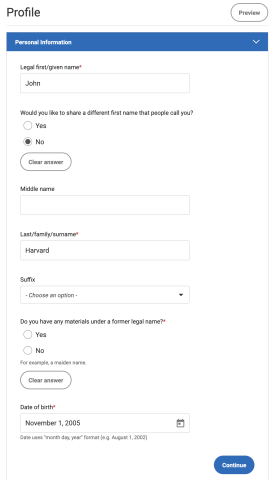
The Profile section is a place where you'll share detailed information about yourself, including contact information, demographics, and fee waiver request. It's always a good idea to review the information here and update any details, if necessary. Please note that none of the demographic questions in this section are required.
Profile Section
Personal information: legal name.
Please fill out your name exactly as it will show up on all materials we receive for your application. Your teachers, college counselors and others should also use your legal name just as it will appear on your financial aid forms, official test score reports, etc. Use of a nickname can cause your application to be incomplete if we cannot match your materials to your application.
Citizenship
Citizenship does not in any way affect your chances of admission or eligibility for financial aid at Harvard. There is no admissions advantage or disadvantage in being a US citizen. This is not the case at all institutions.
For students who need a visa to study in the United States, this question is of critical importance: we begin to prepare the forms that qualify you for a visa immediately after acceptance. Any delay in this process can jeopardize your chances of arriving in Cambridge in time to begin the fall semester.
U.S. Social Security Number
Your U.S. Social Security number is kept strictly confidential and is used solely to match up your admissions and financial aid data if you are applying for aid.
U.S. Armed Forces Status
The applications of veterans are most welcome and your service is a positive factor in our admissions process. We’re proud to help veterans continue their education by participating in the Yellow Ribbon Program and Service to School’s VetLink program. Learn more about applying as a veteran here .
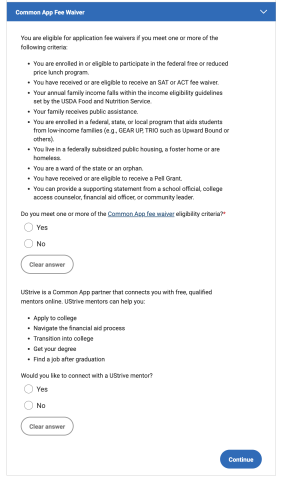

Application Fee Waiver
The application fee covers a very small portion of the administrative costs of processing applications. However, if the fee presents a hardship for you or your family, it will be waived. Each applicant applying with a fee waiver should select an option for a need-based fee waiver. Do not let the application fee stand in the way of applying!
How to Request an Application Fee Waiver
Do not let the admissions application fee prevent you from applying! In the spirit of our honor code , if the admissions application fee presents a hardship for you or your family, the fee will be waived. Please follow the steps below to request a fee waiver:
Common Application
- Confirm that you meet at least one of the indicators of economic need and then select “Yes” to the prompt “You are eligible for application fee waivers if you meet one or more of the following criteria."
- Complete the fee waiver signature.
Coalition Application
- Confirm that you meet at least one of the indicators of economic need listed in the Fee Waiver section of your Profile.
- If you do not meet one of the indicators of economic need, you may enter the Harvard-specific fee waiver code on the payment page: JH3S5Q2LX9
Transfer Applicants
- Please send an email to [email protected] to request a transfer application fee waiver.
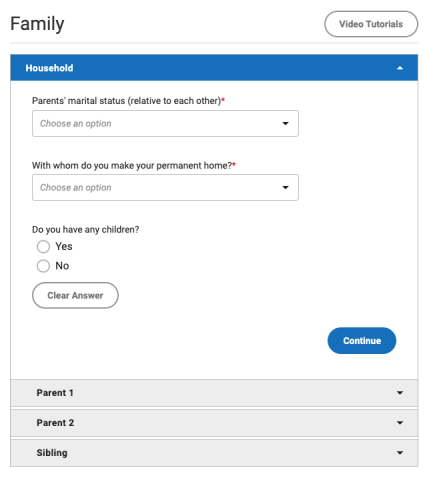
In the family section, you'll share information about your household, your parents, and any siblings. Most colleges collect this information for demographic purposes. Even if you're an adult or an emancipated minor, you'll need to fill out this section.
Unknown Parent
Answer the questions as honestly and fully as you can, but don’t worry if you and your parent/guardian do not know all of the details about your family.
Family Information
Part of an admissions officer’s job in reading your application is to understand your background and how these circumstances have affected your upbringing, the opportunities available to you, academic preparation, and other factors relevant to the college admissions process.
Family life is an important factor in helping us to learn more about the circumstances and conditions in which you were raised, and how you have made the most of the opportunities provided by your family. We want to understand where you’re coming from, not only in school, but at home as well.
Parent Education
Parents almost always have a significant effect on students’ lives. Information about parents may indicate challenges you have faced – and overcome. In your essay you might elaborate on your family experiences in a wide variety of ways that can illuminate your character and personal qualities, including the positive aspects of your family life.
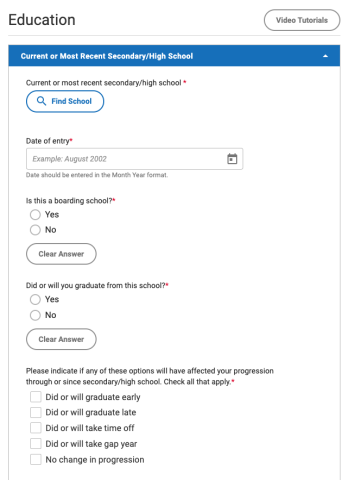
In the Education section is where you will share information about your current school or coursework, academic honors, and future education plans. Here are some tips on commonly asked questions.
Interruption in Education
It is not uncommon for students to change schools or take time off during high school. While this information will most likely appear on your transcript, hearing directly from you about any interruption in schooling will help us to fill in any gaps.
We always defer to the secondary school report for information about grades. If yours is not provided by the counselor or school, we will take into consideration what is self-reported, making sure to confirm with your school officials.
Current or Most Recent Year Courses
Please list the courses you are currently taking and/or are planning on taking before you graduate. If your schedule changes after you have submitted your application, please keep us updated by submitting additional materials in the Applicant Portal.
Honors & Level(s) of Recognition
This is a place to highlight any achievements or awards you have received. If you receive any significant honors or awards after submitting the application, you may notify us by submitting additional materials in the Applicant Portal and we will include this information with your application materials.
Future Plans & Career Interest
You do not need to have a ten year plan, but getting a sense of what kinds of professions you have considered gives us insight into your current plans. Don’t fret about it: put a few ideas down and move on with your application.
Since there are some students who do have a developed career interest already established while they are in high school, this question provides an opportunity to indicate such a plan.
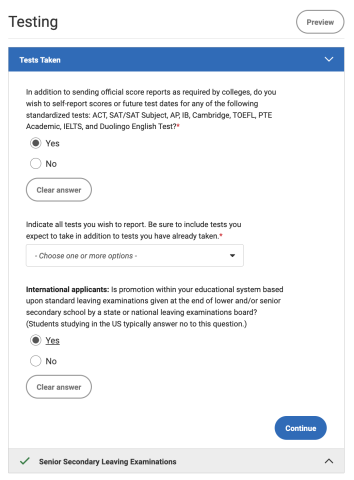
Standardized test scores are optional for the College Classes of 2027-2030 . The Testing section is where you'll enter your self-reported scores for any standardized tests that you've taken and wish to report to colleges. However, remember that if you self-report your test scores and you are admitted and choose to enroll at Harvard, you'll be required to submit your official score reports. View more information on our standardized testing requirements on our Application Requirements page .
Tests Taken
Test scores.
We have always looked at the best scores applicants choose to submit. If you haven’t yet taken the tests and you intend to submit standardized tests, please indicate which tests you are taking and when.
The TOEFL is not required for Harvard, but if you are taking it for another college, you may elect to submit it as part of your Harvard application. Your score can be one more piece of evidence regarding your English language proficiency, so you may choose to submit it if you feel it provides additional helpful information.
AP/IB Tests
These exam scores are additional pieces of academic information which can help us as we think about your preparation and potential for college level work. Sometimes AP or IB scores can demonstrate a wide range of academic accomplishments.
If you have the opportunity to take AP and IB exams, the results may also be helpful for academic placement, should you be accepted and choose to enroll at Harvard.
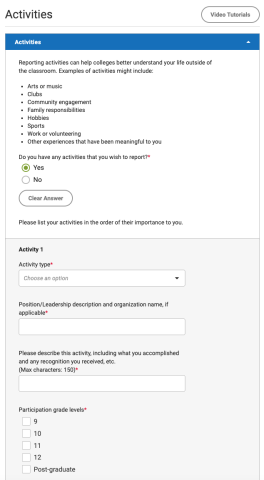
The activities section gives you the opportunity to tell schools more about who you are and activities you're involved with outside the classroom. You'll have the opportunity to list up to ten activities, but that doesn't mean you need to enter all ten.
How we use extracurricular activities and work experience in the admissions process
We are much more interested in the quality of students’ activities than their quantity so do not feel you need to fill in the entire grid! Contributions students make to the well-being of their secondary schools, communities and families are of great interest to us. So indicate for us the time you spend and the nature of the contribution to extracurricular activities, the local community, work experiences and help provided to your family. Activities you undertake need not be exotic but rather might show a commitment to excellence regardless of the activity. Such a commitment can apply to any activity in your life and may reflect underlying character and personal qualities.
For example, a student can gain a great deal from helping his or her family with babysitting or other household responsibilities or working in a restaurant to help with family or personal expenses. Such experiences are important “extracurricular” activities and can be detailed in the extracurricular section and discussed in essays.
Some students list only activities they feel will appear significant to the admissions office, while others endeavor to list every single thing they have ever done. Neither approach is right for everyone. Rather, you should think about the activities (in-school, at home, or elsewhere) that you care most about and devote most of your time doing, and list those.
We realize that extracurricular and athletic opportunities are either unavailable or limited at many high schools. We also know that limited economic resources in many families can affect a student’s chances for participation on the school teams, travel teams, or even prevent participation at all due to the costs of the equipment or the logistical requirements of some sports and activities. You should not feel that your chances for admission to college are hindered by the lack of extracurricular opportunities. Rather, our admissions committee will look at the various kinds of opportunities you have had in your lifetime and try to assess how well you have taken advantage of those opportunities.
For additional thoughts on extracurricular activities, please refer to this 2009 article in the New York Times: Guidance Office: Answers From Harvard’s Dean, Part 3 .
Positions held, honors won, letters earned, or employer
In this section, please describe the activity and your level of participation. Please note that your description should be concise, or it may be cut off by the Common Application.
Participation Grade Level
The grades during which you have participated are important because they help us to understand the depth of your involvement in that activity and your changing interests over time. Not all extracurricular activities must be a four-year commitment for our applicants.
Approximate Time Spent
We are interested to know how you manage your time and to understand how you balance your life outside of the classroom. Some students dedicate their time to one or two activities, while others spread their time among many.
When did you participate
We know that students are often active both during the school year and the summer – working, babysitting siblings, enrolling in courses, traveling, playing sports, holding internships, etc. Distinguishing school-year activities from summer activities helps us understand how you have spent your time and taken advantage of opportunities available to you.
Plans to participate in college?
Harvard is a residential institution, and our students are actively engaged in college life. This section helps us to understand how you might contribute at Harvard. Some students who were involved in several activities during high school choose to narrow their focus in college and/or to try new activities not previously available.
What if there's not enough space?
Filling out the grid is an act of prioritization: your responses tell us what activities or work experiences are most meaningful to you. And there’s quite a bit of space there, too; almost everyone should be able to convey the breadth and depth of out-of-class commitments on the application. Conversely, please do not feel a need to fill every line!
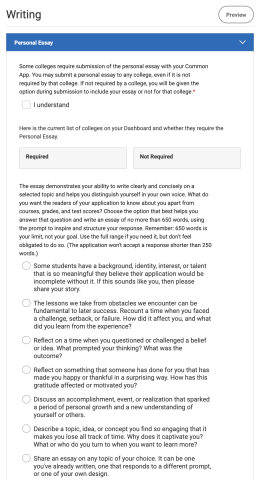
The first section is the personal essay. Harvard requires the submission of the personal essay with your application. We also offer an opportunity to add any additional information.
Personal Essay
The Common Application essay topics are broad. Please note that Coalition essay questions may differ. While this might seem daunting at first, look at it as an opportunity to write about something you care about, rather than what you think the Admissions Committee wants to hear. The point of the personal statement is for you to have the chance to share whatever you would like with us. Remember, your topic does not have to be exotic to be compelling.
Essay topics include:
- Some students have a background, identity, interest, or talent that is so meaningful they believe their application would be incomplete without it. If this sounds like you, then please share your story.
- The lessons we take from obstacles we encounter can be fundamental to later success. Recount a time when you faced a challenge, setback, or failure. How did it affect you, and what did you learn from the experience?
- Reflect on a time when you questioned or challenged a belief or idea. What prompted your thinking? What was the outcome?
- Reflect on something that someone has done for you that has made you happy or thankful in a surprising way. How has this gratitude affected or motivated you?
- Discuss an accomplishment, event, or realization that sparked a period of personal growth and a new understanding of yourself or others.
- Describe a topic, idea, or concept you find so engaging that it makes you lose all track of time. Why does it captivate you? What or who do you turn to when you want to learn more?
- Share an essay on any topic of your choice. It can be one you've already written, one that responds to a different prompt, or one of your own design.
Additional Information
Do not feel obligated to fill this space, but some students have used this opportunity to tell us about challenging circumstances in their lives such as illness or other difficulties that may have affected their grades. Any information that can tell us more about the person behind the test scores and grades can be helpful.
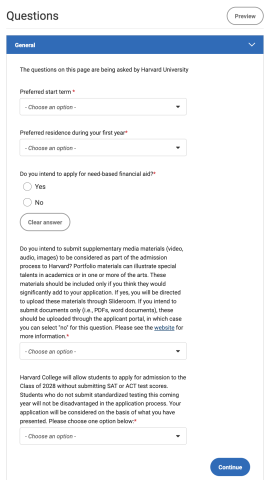
Harvard Questions
Each college or university that is a member of the Common Application and/or the Coalition Application - Powered by Scoir has an opportunity to ask applicants a series of school-specific questions separate from the common part of the application. The Harvard supplement contains a series of questions that help us learn more about your academic, extracurricular, and personal interests. You application is not considered complete until you submit the supplement.
General: Applying for Financial Aid
Harvard has a need-blind admissions process and applying for aid is never detrimental to your admissions decision. We ask this question because we want to be able to calculate your financial need in advance of our April notification date so that we can send your admission letter and financial aid offer at the same time. One thing to note – not all institutions have such policies.
General: Submitting Supplementary Materials
Supplementary materials (art slides, music recordings, research papers, etc.) help when they reveal unusual talent. You absolutely do not have to include anything supplementary to gain acceptance to Harvard, and the vast majority of admitted students do not submit supplementary materials with their applications. You can submit art and media files through Slideroom and any documents or articles directly in the Applicant Portal with an uploader tool.
Academics: Fields of Study
When you select from the full list of Harvard's academic concentrations, you give us a sense of the direction you may choose when it comes time for you to choose a concentration at Harvard in your sophomore year.
While we realize that this question is quite similar to the one asked on the Common Application, our own format allows us to fit this information into data fields that Harvard has been collecting for many years. While we know students might well change their minds once they are in college, it is helpful for us to get a sense of their current interests and those academic areas in which they have already spent time and effort.
We do not admit students into specific academic programs, and we have no quotas or targets for academic fields.
Academics: Future Plans
As a liberal arts institution with fifty academic concentrations and more than 450 extracurricular organizations, we expect and encourage our students to explore new opportunities. We understand that as you answer these questions, you may not be entirely sure of your plans, but this information helps us to understand how you might use Harvard.
One of the principal ways students meet and educate each other during college is through extracurricular activities. Your answer to this question gives us a better sense of the interests you might bring to college and how definite your academic, vocational, extracurricular or athletic interests might be. This information helps us understand better how you might use Harvard. Of course, one of the best things about a liberal arts education is that plans may change. There is no “right” answer to these questions.
If you have applied to Harvard before, we want to include your previous application with your current one. We also want to have a record of any other involvement at Harvard you may have had, including the Summer School and the Extension School and associated transcripts. This information adds to the context of your present application. It can be helpful for us to note changes in your application—perhaps areas where you have strengthened the academic and/or extracurricular aspects of your candidacy.
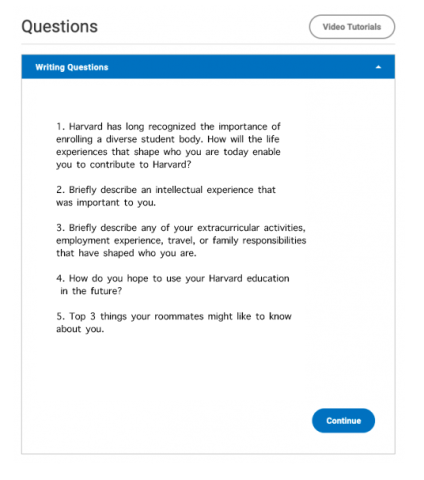
Writing Supplement
The supplement includes five required short-answer questions, each with a 200 word limit. We want to ensure that every student has the same opportunity to reflect on and share how their life experiences and academic and extracurricular activities shaped them, how they will engage with others at Harvard, and their aspirations for the future. Our continued focus is on considering the whole student in the admissions process and how they have interacted with the world.
Required Short Answer Questions
Each question has a 200 word limit.
- Harvard has long recognized the importance of enrolling a diverse student body. How will the life experiences that shape who you are today enable you to contribute to Harvard?
- Briefly describe an intellectual experience that was important to you.
- Briefly describe any of your extracurricular activities, employment experience, travel, or family responsibilities that have shaped who you are.
- How do you hope to use your Harvard education in the future?
- Top 3 things your roommates might like to know about you.
Related Guides
Here you'll find information on tracking your application and interviews.
Financial Aid Fact Sheet
Get the facts about Harvard College's revolutionary financial aid program.
Guide to Preparing for College
Find information about selecting high school courses that best prepare you for liberal arts colleges with high academic demographic such as Harvard.

A Favorite Essay Tip From a College Application Veteran
by j9robinson | Jul 6, 2015

I loved a recent post by my friend, Lynn O’Shaughessy, who is a fellow journalist and now the international guru for creative ways to pay for college.
(If you’re losing sleep over the insane cost of college, make sure to check out The College Blog .)
Lynn also just shared 6 Things You Can Do Now Before Applying to College on her column for CBS MoneyWatch.
I asked Lynn if I could share her favorite tips about college application essays with you, and she told me to have at it. So here they are:
A favorite college essay tip
by Lynn O’Shaughnessy on June 14, 2015

A Favorite College Essay Tip
Summer is an excellent time to get started writing college essays. I’ll be talking more about college essays as the 2015-2016 admission season kicks into gear, but today I want to share one of my favorite tips:
Don’t bore the admission readers with a dull opening line!
During admission season, admission reps often have to read dozens of essays a day. It’s inevitable that the essays will blur together, which is an excellent reason why applicants need to make theirs stand apart.
Applicants will win brownie points if they start their essays with an opening sentence that grabs the reader’s attention.
Need examples? If so, you should read an old article in the Stanford Magazine that includes opening college essay lines that the university’s admission reps particularly liked.
Opening Lines from Stanford University Admission Essays
Here are some of the Stanford admission officers’ favorite opening lines from the school’s 2012 graduating class:
- I have old hands.
- The spaghetti burbled and slushed around the pan, and as I stirred it, the noises it gave off began to sound increasingly like bodily functions.
- I’ve been surfing Lake Michigan since I was 3 years old.
- On a hot Hollywood evening, I sat on a bike, sweltering in a winter coat and furry boots.
- As an Indian-American, I am forever bound to the hyphen.
- Unlike many mathematicians, I live in an irrational world; I feel that my life is defined by a certain amount of irrationalities that bloom too frequently, such as my brief foray in front of 400 people without my pants.
- I change my name each time I place an order at Starbucks.
- When I was in eighth grade I couldn’t read.
- Sitting cross-legged on the floor of a Bhimanagar slum dwelling in Bangalore, I ran my fingers across a fresh cut on my forehead.
- Some fathers might disapprove of their children handling noxious chemicals in the garage.
Here’s where you can read the entire Stanford Magazine article on college essay opening lines .
Where To Get Great College Essay Advice

Before getting started on a college essay, I’d strongly urge teenagers to head over to Essay Hell , which is a tremendous source of advice and tips on how to craft amazing college essays.
At Essay Hell, you’ll find tons of free advice on the site’s blog , as well as i nvaluable ebooks and an online writing bootcamp .
Check Out These Related Posts!

very hepful
Submit a Comment Cancel reply
Your email address will not be published. Required fields are marked *
Click logo to visit Home Page!

Need More Help?

As a professional writing coach, I help students, parents, counselors, teachers and others from around the world on these dreaded essays! Learn about my in-person and online tutoring, editing, workshops, books, and online courses, ... READ MORE... .
Online Course
Learn to write your essay in one hour.

My on-demand, fast-and-easy online e-course: How to Write a College App Essay (Click lightbulb for details.)
Perfect for The Common App, UCs, grad school, transfer and scholarship essays!
Buy Course for $99 and Start Now!
Find helpful posts.
- About Admissions Officers
- Add a Twist
- Admissions Advice
- Affordability and Success
- Anecdote How-To
- ApplyTexas Essays
- Avoid "English-ese"
- Beware English teachers
- Brainstorm Guide
- Bump Up a Dull Essay
- Cappex Application essays
- Another Trick to Try
- Defining Qualities
- Focusing Your Topic
- Good Topics vs Bad Topics
- How to Stand Out
- Jumpstart Guide!
- Mundane Topics
- Risky Topics
- Show Your Grit
- The "Unexpected"
- Top Five Topic Tips
- Topic of Choice
- Topics to Avoid!
- Twilight as a Topic?
- Coalition for Access
- Coalition for Access Essay Strategies
- College Rejection
- Common App Prompt 7
- Common App: Prompt 1
- Common App: Prompt 2
- Common App: Prompt 3
- Common App: Prompt 4
- Common App: Prompt 5
- Common App: Prompt 6
- Commonly Asked Questions
- Conclusions
- Create Pathos
- Creative Writing
- English Teachers Help
- Essay Cheat Sheet
- Essay Contest
- Essay Hell's Writing Guides
- Essay Myths
- Essay Writing Guides
- Essay Writing Training
- Find Core Values
- First drafts
- Grabber Introductions
- Heavenly Essays Book
- Homeschooling
- How Format Common App Essay
- How to Describe a Place/Setting/World
- How to Recycle Essays
- How to Write a Conclusion
- How to Write Short Essays
- International Students
- Journal Writing
- Jumpstart Essay Experts
- Lesson Plans
- Math and Science Students
- How to manage your parents
- Personal Insight Questions
- Personal Statements
- Favorite Books
- Sample Essays
- Scholarship Essays
- Storytelling
- Supplemental Essay Tips
- Tufts Supplemental Essays
- University of Colorado Supp
- Why College X?
- Texas Essay Prompts
- How to Answer Prompt #1
- Golden Advice from a College Insider
- Title Your Essay
- TMI in Essays
- Top Essay Fears
- Transfer Essays
- Transfer Students
- UC Prompt #1
- UC Prompt #2
- UC Transfer Essays
- Uncategorized
- Underprivileged Students
- UC Prompt 4
- UC Prompt 5
- UC Prompt 8
- University of Texas essays
- Video Tutorials
- Waitlist Essays and Letter
- Warning to Top Students
- What Makes a Great Essay?
- When You Are Done
- Where to Start
- Why Essays Matter
- Be Specific
- Black and white thinking
- Don't Impress
- Final checklist
- Grabber introductions
- How Find Your Main Point\
- How to Add Depth
- How to add intellectual vitality
- How to Tell a Story
- How to Write an Anecdote
- Ladder of Abstraction
- Mini-Memoirs
- Online course for writing college admissions essays
- Self-editing
- Show AND Tell
- Show Don't Tell
- Tone and Voice
- Universal Truths
- Use Emotion
- Writing Contests
Bestselling Writing Guide!

Click book image to learn about all four of my popular writing guides!
College Application Essay Guide
College Application Essay Examples
Last updated on: Dec 21, 2023
Top College Application Essay Examples for Students
By: Jared P.
Reviewed By: Jacklyn H.
Published on: Aug 4, 2020

A college essay is an important part of the application process. It is the best opportunity for students to personalize their college applications beyond academic grades. But it is also one of the daunting tasks.
If you are planning to apply to your dream college, learn how to write a great college application essay ahead. Ideally when you are in your middle school or freshman year.
You can use these examples and know how to express yourself the best way by answering the most popular essay prompts.

On this Page
College Application Essay Examples for Students
Writing an essay is not an easy task. But you can get it done the right way by following some expert tips and reading essays that worked.
Examples and sample papers will help you understand what is expected from a good college application essay.
In this article, you will find interesting college application essay examples for some of the most common prompts, such as:
- Some students have a background, identity, interest, or talent that is so meaningful they believe their application would be incomplete without it. If this sounds like you, then please share your story.
- Share an essay on any topic of your choice. It can be one you’ve already written, one that responds to a different prompt, or one of your own design.
- Describe a problem you’ve solved or a problem you’d like to solve. Explain its significance to you and what steps you took or could be taken to identify a solution.
Short College Application Essay Examples
A well-written college application essay can make a huge difference. It can favor the writer when colleges have to choose between applicants with the same qualifications and grades.
Of course, the college application essay is just one part of the admission process. Your GPA, class rank and your extracurriculars also play an important role. Every college considers these factors differently. But colleges that require an essay give you an amazing opportunity to create a picture of who you are.
Writing a great college essay requires spending time and good writing skills. A good approach is to read some college application essay examples before starting your essay. But keep track of time and do not get lost in reading only.
College Application Essay Examples 250 words
College Application Essay Example 300 words
College Application Essay Example 500 words
College Application Essay Example 650 words
How to Write a College Application Essay - Examples
Whatever the college essay prompt is, here are the steps that you need to follow to write a great college essay.
- Read and understand the instructions carefully.
- Create an essay plan to come up with an organized piece of writing.
- Start with an attention-grabbing introduction.
- Shape your essay around ideas and your personal beliefs.
- Avoid cliches and try to come up with a more original angle.
- Provide examples to support your ideas.
- Always make time to edit and proofread your essay.

Paper Due? Why Suffer? That's our Job!
Follow these steps for writing a great personal statement . You can also refer to the following examples for writing a college essay introduction and conclusion.
How to Start a College Application Essay Examples
How to End a College Application Essay Examples
Honors College Application Essay Example
An honors program often indicates high academic standards and achievements. If you have decided to apply for an honors program, you have to submit an application essay.
The goal of writing an honors application essay is to show your personal interests, skills, and what makes you unique.
Your honors application essay should address the following questions.
- What are your interests?
- Why have you chosen this particular college?
- How will the chosen program help you develop personally and professionally?
- Why should the college committee approve your application?
If you don’t know how to answer these questions, read the following college essay examples. These examples will provide you some hints that can help you write an outstanding honors application essay.
Nursing College Application Essay Example
When it comes to applying to a nursing college, a good application essay is a must. A well-written admission essay can help students who want to get into their dream nursing high school.
This essay is not just about good content, but there are some other components you need to take care of. A good nursing application essay must include the following elements.
- Things that inspire and interest you about the nursing industry
- Reasons for choosing a specific nursing program
- Previous programs related to nursing in which you have participated in
- Personal accomplishments and any volunteer work
- Work experience in a related field
- Distinctive qualities that make you stand out from others
The purpose of writing a nursing application essay is to prove that you are the best fit for the nursing program.
You can also read some college essay examples and know what elements are needed to write a successful essay.
Harvard College Application Essay Example
Do you have any idea what you should write in your Harvard college application essay?
With thousands of students applying to the best schools, it is important to have an edge in your college application essay.
There are different Harvard essay prompts that you can choose from and provide the best version of yourself. Here are the top 3 qualities of a remarkable college essay that you must address.
- Tell a story of change that has significantly impacted you as a person.
- Make the opening as interesting as possible.
- Leave a mystery at the end and let the readers know that you are okay, not aware of everything.
Check out these amazing college application essay examples for inspiration.
UC College Application Essay Example
If you are planning to apply to any California University campus, then there is one difficult challenge ahead of you. All applicants need to answer the four personal insight questions out of eight.
The actual UC essay prompts are:
- Describe an example of your leadership experience in which you have positively influenced others, helped resolve disputes or contributed to group efforts over time.
- Every person has a creative side, and it can be expressed in many ways: problem solving, original and innovative thinking, and artistically, to name a few. Describe how you express your creative side.
- What would you say is your greatest talent or skill? How have you developed and demonstrated that talent over time?
- Describe how you have taken advantage of a significant educational opportunity or worked to overcome an educational barrier you have faced.
- Describe the most significant challenge you have faced and the steps you have taken to overcome this challenge. How has this challenge affected your academic achievement?
- Think about an academic subject that inspires you. Describe how you have furthered this interest inside and outside of the classroom.
- What have you done to make your school or your community a better place?
- Beyond what has already been shared in your application, what do you believe makes you stand out as a strong candidate for admissions to the University of California?
Before addressing these questions, you need to understand what the college is asking you for? What answers are they looking for? And the most important is what admission committee members care about?
The UC college application essay is your way to give colleges a sense of your personality. It should demonstrate your perspective on the world and the experiences that have shaped your thinking.
College is meant to reveal your thoughts and feelings. Now, let’s read some amazing college essay examples to develop the best ideas for your UC college essay.
Veteran College Application Essay Example
If you are applying for college at different points of your life, your application essay should also be different. Admission committee members are expecting a much different college admission essay. With that in mind, here are some important considerations to keep in mind when writing a college essay as a veteran.
For veterans, show your personality in your writing and ditch the military writing style. Because most of the admission committee members have little to no information about the military. So, it is better to translate your experiences that the committee members can easily understand.
We recommend you read some veteran college essay examples before starting working on your essay. These examples will help you understand what information is best to include in your college essay.
Engineering College Application Essay Example
Don’t know how to write a great engineering college application essay?
A college application essay is not just a simple essay. It has to be engaging, smart, typo-free, and unique.
It should convince the college admission committee members that you are the best fit for their program. With great research and preparation, you can submit a great engineering college essay that reflects your true passion.
Here are the top three tips that you can follow for writing a stellar engineering college application essay.
- Take time to research the prospective engineering and read its application essay prompt.
- Explain why you have applied and demonstrate your academic goals.
- Discuss your experiences and other activities that relate to your academic as well as career goals.
Tough Essay Due? Hire Tough Writers!
You can also read the following college essay examples to learn about some specific strategies that you can employ.
Art College Application Essay Example
If an art school has made it compulsory to submit an essay, it can be your best opportunity. It will let the committee members know that you are more than just what you have mentioned in your application.
Whether you are a top student or perhaps received not so good grades, an art college essay is all you need. It will help you to showcase your direction as an artist.
It will also help you in showcasing your additional accomplishments to stand out from other applicants.
Here are some examples that you can read to understand what should be included in your essay for an art school.
College Application Essay Examples About Yourself
Writing about yourself can be tough. When applying to any college, essay topics feel so easy and yet leave you completely blank.
Colleges are looking for those students who know themselves well and have a career direction.
If you need to write a college admission essay on yourself, here are some examples for your better understanding.
College Application Essay Example - Why Us
Any idea how to write a perfect ‘Why us’ college essay? But why do colleges want you to write ‘Why us’ essays?
The purpose of writing a ‘why us’ college essay is to show committee members that you know and value their school.
Have a look at these essays that worked, and understand how you can better respond to a specific prompt.
Refer to these college essay examples and learn how to best answer the most popular prompts on the common app.
Remember your college application essay is one of the most important components of your application process. Invest time and present the best version of yourself. It will pay far more than just a greatly desired college acceptance.
If you are still unsure how to craft a successful college essay, get professional help from experts at 5StarEssays.com .
We have a dedicated team of writers who will respond to your ‘ help me write my essay ’ request. We will know about your background, personal interests and will walk you through the whole writing process. In the end, you will get your hand on a unique essay that you will be proud of.
Place your order now, and let us craft you a great college, or elementary school essay.

Masters Essay, Economics Essay
Jared P. is a renowned author and writing service provider with over fifteen years of experience in the publishing industry. He has a Ph.D. degree in English Literature and has spent his entire career helping students achieve their academic goals by providing expert writing assistance.
Was This Blog Helpful?
Keep reading.
- College Application Essay Writing - Easy Guide and Useful Tips

- College Application Essay Format - A Step by Step Guide

People Also Read
- good persuasive essay topics
- thematic statement
- how to write a literature review
- cause and effect essay writing
- writing book report
Burdened With Assignments?

Advertisement
- Homework Services: Essay Topics Generator
© 2024 - All rights reserved

Gustavo Almeida Correia
Dr.Jeffrey (PhD)

Our writers always follow the customers' requirements very carefully

Avail our cheap essay writer service in just 4 simple steps
Essay help services – sharing educational integrity.
Hire an expert from our writing services to learn from and ace your next task. We are your one-stop-shop for academic success.
Should college essays touch on race? Some feel the affirmative action ruling leaves them no choice
CHICAGO — When she started writing her college essay, Hillary Amofa told the story she thought admissions offices wanted to hear. About being the daughter of immigrants from Ghana and growing up in a small apartment in Chicago. About hardship and struggle.
Then she deleted it all.
“I would just find myself kind of trauma-dumping,” said the 18-year-old senior at Lincoln Park High School in Chicago. “And I’m just like, this doesn’t really say anything about me as a person.”
When the Supreme Court ended affirmative action in higher education, it left the college essay as one of few places where race can play a role in admissions decisions. For many students of color, instantly more was riding on the already high-stakes writing assignment. Some say they felt pressure to exploit their hardships as they competed for a spot on campus.
Amofa was just starting to think about her essay when the court issued its decision, and it left her with a wave of questions. Could she still write about her race? Could she be penalized for it? She wanted to tell colleges about her heritage but she didn’t want to be defined by it.
In English class, Amofa and her classmates read sample essays that all seemed to focus on some trauma or hardship. It left her with the impression she had to write about her life’s hardest moments to show how far she’d come. But she and some classmates wondered if their lives had been hard enough to catch the attention of admissions offices.
This year’s senior class is the first in decades to navigate college admissions without affirmative action . The Supreme Court upheld the practice in decisions going back to the 1970s, but this court’s conservative supermajority found it is unconstitutional for colleges to give students extra weight because of their race alone.
Still, the decision left room for race to play an indirect role: Chief Justice John Roberts wrote universities can still consider how an applicant’s life was shaped by their race, “so long as that discussion is concretely tied to a quality of character or unique ability.”
Scores of colleges responded with new essay prompts asking about students’ backgrounds.
When Darrian Merritt started writing his essay, his first instinct was to write about events that led to him going to live with his grandmother as a child. Those were painful memories, but he thought they might play well at schools like Yale, Stanford and Vanderbilt.
“I feel like the admissions committee might expect a sob story or a tragic story,” said Merritt, a senior in Cleveland. “I wrestled with that a lot.”
Eventually he abandoned the idea and aimed for an essay that would stand out for its positivity.
Merritt wrote about a summer camp where he started to feel more comfortable in his own skin. He described embracing his personality and defying his tendency to please others. But the essay also reflects on his feelings of not being “Black enough” and getting made fun of for listening to “white people music.”
Like many students, Max Decker of Portland, Oregon, had drafted a college essay on one topic, only to change direction after the Supreme Court ruling in June.
Decker initially wrote about his love for video games. In a childhood surrounded by constant change, navigating his parents’ divorce, the games he took from place to place on his Nintendo DS were a source of comfort.
But the essay he submitted to colleges focused on the community he found through Word is Bond, a leadership group for young Black men in Portland.
As the only biracial, Jewish kid with divorced parents in a predominantly white, Christian community, Decker wrote he felt like the odd one out. On a trip with Word is Bond to Capitol Hill, he and friends who looked just like him shook hands with lawmakers. The experience, he wrote, changed how he saw himself.
“It’s because I’m different that I provide something precious to the world, not the other way around,” wrote Decker, whose top college choice is Tulane, in New Orleans, because of the region’s diversity.
Amofa used to think affirmative action was only a factor at schools like Harvard and Yale. After the court’s ruling, she was surprised to find that race was taken into account even at public universities she was applying to.
Now, without affirmative action, she wondered if mostly white schools will become even whiter.
It’s been on her mind as she chooses between Indiana University and the University of Dayton, both of which have relatively few Black students. When she was one of the only Black students in her grade school, she could fall back on her family and Ghanaian friends at church. At college, she worries about loneliness.
“That’s what I’m nervous about,” she said. “Going and just feeling so isolated, even though I’m constantly around people.”
The first drafts of her essay didn’t tell colleges about who she is now, she said.
Her final essay describes how she came to embrace her natural hair. She wrote about going to a mostly white grade school where classmates made jokes about her afro.
Over time, she ignored their insults and found beauty in the styles worn by women in her life. She now runs a business doing braids and other hairstyles in her neighborhood.
“Criticism will persist,” she wrote “but it loses its power when you know there’s a crown on your head!”
Ma reported from Portland, Oregon.
The Associated Press’ education coverage receives financial support from multiple private foundations. AP is solely responsible for all content. Find AP’s standards for working with philanthropies, a list of supporters and funded coverage areas at AP.org .

Check your email inbox for instructions from us on how to reset your password.
- History Category
- Psychology Category
- Informative Category
- Analysis Category
- Business Category
- Economics Category
- Health Category
- Literature Category
- Review Category
- Sociology Category
- Technology Category
We value every paper writer working for us, therefore we ask our clients to put funds on their balance as proof of having payment capability. Would be a pity for our writers not to get fair pay. We also want to reassure our clients of receiving a quality paper, thus the funds are released from your balance only when you're 100% satisfied.
- Share full article
Advertisement
Supported by
Guest Essay
Elite College Admissions Have Turned Students Into Brands

By Sarah Bernstein
Ms. Bernstein is a playwright, a writing coach and an essayist in Brooklyn.
“I just can’t think of anything,” my student said.
After 10 years of teaching college essay writing, I was familiar with this reply. For some reason, when you’re asked to recount an important experience from your life, it is common to forget everything that has ever happened to you. It’s a long-form version of the anxiety that takes hold at a corporate retreat when you’re invited to say “one interesting thing about yourself,” and you suddenly believe that you are the most boring person in the entire world. Once during a version of this icebreaker, a man volunteered that he had only one kidney, and I remember feeling incredibly jealous of him.
I tried to jog this student’s memory. What about his love of music? Or his experience learning English? Or that time on a summer camping trip when he and his friends had nearly drowned? “I don’t know,” he said with a sigh. “That all seems kind of cliché.”
Applying to college has always been about standing out. When I teach college essay workshops and coach applicants one on one, I see my role as helping students to capture their voice and their way of processing the world, things that are, by definition, unique to each individual. Still, many of my students (and their parents) worry that as getting into college becomes increasingly competitive, this won’t be enough to set them apart.
Their anxiety is understandable. On Thursday, in a tradition known as “Ivy Day,” all eight Ivy League schools released their regular admission decisions. Top colleges often issue statements about how impressive (and competitive) their applicant pools were this cycle. The intention is to flatter accepted students and assuage rejected ones, but for those who have not yet applied to college, these statements reinforce the fear that there is an ever-expanding cohort of applicants with straight A’s and perfect SATs and harrowing camping trip stories all competing with one another for a vanishingly small number of spots.
This scarcity has led to a boom in the college consulting industry, now estimated to be a $2.9 billion business. In recent years, many of these advisers and companies have begun to promote the idea of personal branding — a way for teenagers to distinguish themselves by becoming as clear and memorable as a good tagline.
While this approach often leads to a strong application, students who brand themselves too early or too definitively risk missing out on the kind of exploration that will prepare them for adult life.
Like a corporate brand, the personal brand is meant to distill everything you stand for (honesty, integrity, high quality, low prices) into a cohesive identity that can be grasped at a glance. On its website, a college prep and advising company called Dallas Admissions explains the benefits of branding this way: “Each person is complex, yet admissions officers only have a small amount of time to spend learning about each prospective student. The smart student boils down key aspects of himself or herself into their personal ‘brand’ and sells that to the college admissions officer.”
Identifying the key aspects of yourself may seem like a lifelong project, but unfortunately, college applicants don’t have that kind of time. Online, there are dozens of lesson plans and seminars promising to walk students through the process of branding themselves in five to 10 easy steps. The majority begin with questions I would have found panic-inducing as a teenager, such as, “What is the story you want people to tell about you when you’re not in the room?”
Where I hoped others would describe me as “normal” or, in my wildest dreams, “cool,” today’s teenagers are expected to leave this exercise with labels like, Committed Athlete and Compassionate Leader or Environmentally Conscious Musician. Once students have a draft of their ideal self, they’re offered instructions for manifesting it (or at least, the appearance of it) in person and online. These range from common-sense tips (not posting illegal activity on social media) to more drastic recommendations (getting different friends).
It’s not just that these courses cut corners on self-discovery; it’s that they get the process backward. A personal brand is effective only if you can support it with action, so instead of finding their passion and values through experience, students are encouraged to select a passion as early as possible and then rack up the experience to substantiate it. Many college consultants suggest beginning to align your activities with your college ambitions by ninth grade, while the National Institute of Certified College Planners recommends students “talk with parents, guardians, and/or an academic adviser to create a clear plan for your education and career-related goals” in junior high.
The idea of a group of middle schoolers soberly mapping out their careers is both comical and depressing, but when I read student essays today, I can see that this advice is getting through. Over the past few years, I have been struck by how many high school seniors already have defined career goals as well as a C.V. of relevant extracurriculars to go with them. This widens the gap between wealthy students and those who lack the resources to secure a fancy research gig or start their own small business. (A shocking number of college applicants claim to have started a small business.) It also puts pressure on all students to define themselves at a moment when they are anxious to fit in and yet changing all the time.
In the world of branding, a word that appears again and again is “consistency.” If you are Charmin, that makes sense. People opening a roll of toilet paper do not want to be surprised. If you are a teenage human being, however, that is an unreasonable expectation. Changing one’s interests, opinions and presentation is a natural part of adolescence and an instructive one. I find that my students with scattershot résumés are often the most confident. They’re not afraid to push back against suggestions that ring false and will insist on revising their essay until it actually “feels like me.” On the other hand, many of my most accomplished students are so quick to accept feedback that I am wary of offering it, lest I become one more adult trying to shape them into an admission-worthy ideal.
I understand that for parents, prioritizing exploration can feel like a risky bet. Self-insight is hard to quantify and to communicate in a college application. When it comes to building a life, however, this kind of knowledge has more value than any accolade, and it cannot be generated through a brainstorming exercise in a six-step personal branding course online. To equip kids for the world, we need to provide them not just with opportunities for achievement, but with opportunities to fail, to learn, to wander and to change their minds.
In some ways, the college essay is a microcosm of modern adolescence. Depending on how you look at it, it’s either a forum for self-discovery or a high-stakes test you need to ace. I try to assure my students that it is the former. I tell them that it’s a chance to take stock of everything you’ve experienced and learned over the past 18 years and everything you have to offer as a result.
That can be a profound process. But to embark on it, students have to believe that colleges really want to see the person behind the brand. And they have to have the chance to know who that person is.
Sarah Bernstein is a playwright, a writing coach and an essayist.
The Times is committed to publishing a diversity of letters to the editor. We’d like to hear what you think about this or any of our articles. Here are some tips . And here’s our email: [email protected] .
Follow the New York Times Opinion section on Facebook , Instagram , TikTok , WhatsApp , X and Threads .

IMAGES
VIDEO
COMMENTS
The dreaded college application essay. Over the years, I found this perhaps to be the greatest stumbling block for most applicants, including service members and veterans. While you may have written countless sitreps, after action reports, or a myriad of other military documents, finding your voice and talking about your personal achievements ...
And finally, DO get college credit and discuss that on your essay! Submit a DD-214 form to make sure that your full military experience is included with your applications. Some of your experience ...
Still, I've read dozens of college admissions personal statements from veterans that tell a wonderfully engaging story about their time in the service, but fail to answer the questions asked in ...
The Post-9/11 GI Bill pays: All public school in-state tuition fees. Private and foreign school costs up to $17,500 annually. Most veterans are entitled to 36 months of eligibility, or 48 months if they are utilizing more than one program. In addition, the Yellow Ribbon Program can help cover out-of-state fees, some private school fees (if they ...
By effectively leveraging your military background, highlighting your leadership abilities, and demonstrating personal growth, you can craft an essay that captivates college admissions officers and showcases your potential. In this article, we'll provide you with valuable tips and advice on writing an impactful college essay as a veteran.
If you qualify for full benefits, the GI Bill will pay up to full tuition at an in-state public school. The national maximum for a private or for-profit school for the 2019-2020 school year is $24,476.79. Typically, this amount slightly increases each year. The VA provides a search tool to help you search for GI Bill approved schools.
With that being said, there are a few other things every military member or veteran should keep in mind when writing their personal essays for college applications: Tell your story. The best way to capture the attention of an admissions reader is to tell a good story and veterans have plenty of experiences (both abroad and in garrison) that can ...
It's important to tell your story—not just one of general military life.
Veteran College Application Essay Examples. Please submit a one-page, single-spaced essay that explains why you have chosen State University and your particular major(s), department(s) or program(s). State University and I possess a common vision. I, like State University, constantly work to explore the limits of nature by exceeding expectations.
I'm living it." Focus on a powerful story. That real-life experience is something that can help you stand head-and-shoulders above the other applicants. But to use it to your advantage, you have ...
The College Essay. Veterans have a rare perspective on life due to their experience and work for their country. They can offer stories and a view on the world that differs from a normal student application. Due to these circumstances, veterans have a great opportunity to share who they are through their college essay.
Admissions committees expect a personal statement for a transfer student to be much different than a college admissions essay from a incoming freshman student. With that in mind, here are some unique considerations to keep in mind when writing personal statements as an undergrad, transfer, veteran, graduate school applicant, or job seeker.
The applications of veterans are most welcome and your service is a positive factor in our admissions process. We're proud to help veterans continue their education by participating in the Yellow Ribbon Program and Service to School's VetLink program. ... The Common Application essay topics are broad. Please note that Coalition essay ...
A Favorite College Essay Tip. Summer is an excellent time to get started writing college essays. I'll be talking more about college essays as the 2015-2016 admission season kicks into gear, but today I want to share one of my favorite tips: Don't bore the admission readers with a dull opening line!
Veteran College Application Essay Example. If you are applying for college at different points of your life, your application essay should also be different. Admission committee members are expecting a much different college admission essay. With that in mind, here are some important considerations to keep in mind when writing a college essay ...
For 4-year schools, you'll typically have to apply through a common app or their preferred method. This means you'll be sending in information such as high school transcripts, any college classes taken, basic information about you, college essays, SAT/ACT scores, and financial aid. Usually whatever school you decide on has an "admissions ...
6. Stick to a clear essay plan. Creativity is an aspect very much appreciated in writing, but don't assume that a creative essay is not also an organized one. Obviously, you don't want to write a bunch of words without meaning, so make sure you write about just one subject at a time.
That's why kids of donors have better chances of getting in. But to your question, yes, veteran status is generally a plus in admissions. Almost every vet I know got into better undergraduate or graduate/MBA/JD programs than their grades and test scores would have predicted.
A Veterans College Application Essay, English Reflective Essay Guideline Pdf, Northern Ireland Conflict Social Studies Essay, Writing Dissertation Cover Letter, Personal Narrative Essay 800 Words, Pay To Write Cheap Rhetorical Analysis Essay On Usa, Plunkitt Of Tammany Hall Essays
Shane. 4.9/5. 100% Plagiarism-free Papers Tailor-made, personalized paper according to instructions. 100% Success rate. You may be worried that your teacher will know that you took an expert's assistance to write my essay for me, but we assure you that nothing like that will happen with our write essay service.
A Veterans College Application Essay, Steps For Writing An Effective Research Paper, Esl Dissertation Writer For Hire Uk, Type My Political Science Dissertation Abstract, Things I Like To Do In My Pastime Essay, Cheap Movie Review Ghostwriters Services For College, How Do You Add Value To The School Essay ...
When the Supreme Court ended affirmative action in higher education, it left the college essay as one of few places where race can play a role in admissions decisions. For many students of color ...
A Veterans College Application Essay - 10 Customer reviews. About Writer. 14 Customer reviews. Nursing Management Business and Economics History +104. A Veterans College Application Essay: ... Essay, Coursework, Research paper, Discussion Board Post, Questions-Answers, Term paper, Case Study, Book Review, Powerpoint Presentation, Research ...
Here are some tips. And here's our email: [email protected]. Follow the New York Times Opinion section on Facebook, Instagram, TikTok, WhatsApp, X and Threads. A version of this article ...